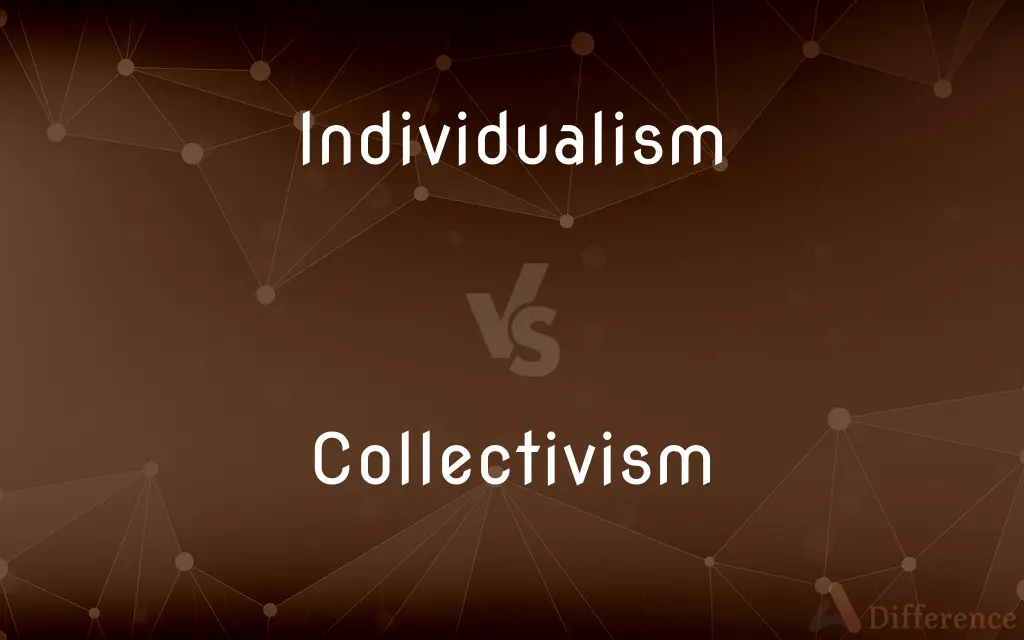Individualism vs. Collectivism — What's the Difference?
By Tayyaba Rehman — Updated on September 15, 2023
Individualism emphasizes personal freedom and self-reliance, while Collectivism prioritizes the group's needs and goals over individual desires.

Difference Between Individualism and Collectivism
Table of Contents
ADVERTISEMENT
Key Differences
Individualism and Collectivism are two contrasting ideologies centered around where the emphasis lies: on the individual or the group. Individualism celebrates the rights and capabilities of the individual, emphasizing personal freedom, independence, and autonomy. In contrast, Collectivism emphasizes the significance of community, society, or group, promoting interconnectedness and cooperation.
In societies that lean towards Individualism, personal achievements, rights, and liberties are highlighted. Such societies value self-expression and encourage individuals to prioritize their own interests, sometimes even if it means going against the larger group. Collectivism, on the other hand, looks at the collective good, where decisions are often made considering the welfare of the group, even if it means sacrificing individual desires.
From a cultural perspective, Individualism often leads to societies where personal responsibility and individual initiative are lauded. People in such societies might be more likely to move out of their family home at a young age or prioritize their own career paths. Collectivist cultures, in contrast, might emphasize family bonds, community initiatives, and group decisions, often leading to multi-generational households and community-driven endeavors.
Even in businesses, these philosophies play out differently. An individualist corporate culture might reward personal achievements, promoting competition and innovation. In contrast, a collectivist corporate environment would prioritize teamwork, shared goals, and collaborative efforts, often leading to consensus-driven decisions.
Comparison Chart
Focus
Individual
Group or collective
ADVERTISEMENT
Values
Personal freedom, autonomy
Group harmony, cooperation
Decision-making
Personal choice and responsibility
Group consensus and shared responsibility
Cultural manifestation
Independence, self-expression
Interdependence, group cohesion
Reward/Recognition system in business
Personal achievements and innovation
Teamwork and group accomplishments
Compare with Definitions
Individualism
A philosophy emphasizing personal freedom and autonomy.
American culture often celebrates Individualism through its emphasis on personal achievements.
Collectivism
Building decisions based on what's best for the group.
In business, Collectivism may lead to group brainstorming sessions before decisions are made.
Individualism
A focus on individual rights over group needs.
The right to free speech is an example of Individualism in democratic societies.
Collectivism
Valuing group cohesion and harmony.
Making decisions through consensus is a hallmark of Collectivism.
Individualism
Valuing self-reliance and independence.
Moving out at 18 showcases the Individualism rooted in many Western cultures.
Collectivism
A philosophy emphasizing group goals over individual desires.
Many Asian cultures lean towards Collectivism, placing family and community at the center.
Individualism
Prioritizing personal goals over group objectives.
Choosing a unique career path reflects Individualism.
Collectivism
Prioritizing the needs and desires of the collective.
Sacrificing personal gain for family welfare often stems from Collectivism.
Individualism
Celebrating individual uniqueness and self-expression.
Artists often embody Individualism by breaking away from traditional norms.
Collectivism
Emphasizing community, shared responsibilities, and interconnectedness.
Community festivals and gatherings are manifestations of Collectivism.
Individualism
Individualism is the moral stance, political philosophy, ideology and social outlook that emphasizes the moral worth of the individual. Individualists promote the exercise of one's goals and desires and to value independence and self-reliance and advocate that interests of the individual should achieve precedence over the state or a social group while opposing external interference upon one's own interests by society or institutions such as the government.
Collectivism
Collectivism is a value that is characterized by emphasis on cohesiveness among individuals and prioritization of the group over the self. Individuals or groups that subscribe to a collectivist worldview tend to find common values and goals as particularly salient and demonstrate greater orientation toward in-group than toward out-group.
Individualism
Belief in the primary importance of the individual and in the virtues of self-reliance and personal independence.
Collectivism
The principles or system of ownership and control of the means of production and distribution by the people collectively, usually under the supervision of a government.
Individualism
Acts or an act based on this belief.
Collectivism
An economic system in which the means of production and distribution are owned and controlled by the people collectively
Individualism
A doctrine advocating freedom from government regulation in the pursuit of a person's economic goals.
Collectivism
The practice or principle of giving a group priority over each individual in it.
Individualism
A doctrine holding that the interests of the individual should take precedence over the interests of the state or social group.
Collectivism
The doctrine that land and capital should be owned by society collectively or as a whole; communism.
Individualism
The quality of being an individual; individuality.
Collectivism
Soviet communism
Individualism
An individual characteristic; a quirk.
Collectivism
A political theory that the people should own the means of production
Individualism
The tendency for a person to act without reference to others, particularly in matters of style, fashion or mode of thought.
Individualism
The moral stance, political philosophy, or social outlook that promotes independence and self-reliance of individual people, while opposing the interference with each person's choices by society, the state, or any other group or institution.
Individualism
(logic) The doctrine that only individual things are real.
Individualism
(philosophy) The doctrine that nothing exists but the individual self.
Individualism
The quality of being individual; individuality; personality.
Individualism
An excessive or exclusive regard to one's personal interest; self-interest; selfishness.
The selfishness of the small proprietor has been described by the best writers as individualism.
Individualism
The principle, policy, or practice of maintaining individuality, or independence of the individual, in action; the theory or practice of maintaining the independence of individual initiative, action, and interests, as in industrial organization or in government.
Individualism
The quality of being individual;
So absorbed by the movement that she lost all sense of individuality
Individualism
A belief in the importance of the individual and the virtue of self-reliance and personal independence
Individualism
The doctrine that government should not interfere in commercial affairs
Common Curiosities
Can Collectivism stifle personal expression?
It can, especially if group harmony is valued over individual self-expression.
How does Collectivism view individual desires?
Collectivism views individual desires secondary to the group's needs and objectives.
Do individualist societies lack community?
No, individualist societies can have strong communities, but they might prioritize personal freedoms within those communities.
Is there a "better" philosophy between the two?
Neither is inherently better; each has its strengths and weaknesses, and their effectiveness can depend on context.
What is the core emphasis of Individualism?
Individualism primarily emphasizes personal freedom and individual rights.
Is Individualism inherently selfish?
No, Individualism values personal autonomy, but it doesn't necessarily equate to selfishness.
How do individualist and collectivist cultures view family?
Individualist cultures might emphasize personal independence, while collectivist cultures often value family interdependence and cohesion.
How do businesses in collectivist cultures operate?
They often emphasize teamwork, group harmony, and consensus in decision-making.
Can one person embody both Individualism and Collectivism?
Yes, many people balance individual desires with group responsibilities in different situations.
Are Western societies always individualist?
While many Western societies lean towards Individualism, there are varied elements of Collectivism present.
Share Your Discovery

Previous Comparison
Rigid vs. Unyielding
Next Comparison
Catchment vs. WatershedAuthor Spotlight
Written by
Tayyaba RehmanTayyaba Rehman is a distinguished writer, currently serving as a primary contributor to askdifference.com. As a researcher in semantics and etymology, Tayyaba's passion for the complexity of languages and their distinctions has found a perfect home on the platform. Tayyaba delves into the intricacies of language, distinguishing between commonly confused words and phrases, thereby providing clarity for readers worldwide.














































